新概念英语第二册第18课
新概念2册18课PPTPPT课件
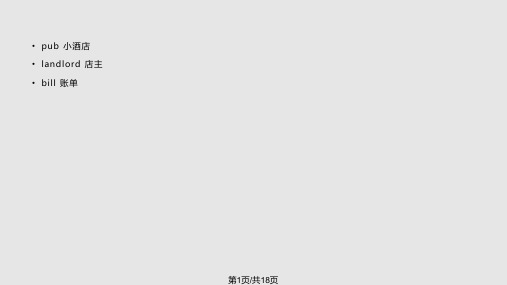
• 3) v. 离开 • leave some place 离开某个地方 • leave for some place 离开去某地 • eg. Leave England for a tour of the world. 离开英国去环球旅游。 • 4) on leave 休假中
第10页/共18页
第6页/共18页
Listening comprehension
第7页/共18页
Te x t • look for 寻找(过程) • eg. I am looking for my bag. • look for a job 找工作 • find 找到(结果,不能用进行时态) • eg. I found my brooch under the sofa. 我是在沙发下面找到胸针的。 • find out 发现,找出,搜出(结果) • eg. You should find out (the answer) for yourself. 你应该自己找出
第5页/共18页
• lord • as drunk as a lord 酩酊大醉 • eg. Lord! 天啊!哎呀!哎哟! • lord n. 贵族,勋爵 • duke [dju:k] 公爵 • marquis ['mɑ:kwɪs, mɑ:'ki:] 侯爵 • earl [ɜ:l] 伯爵 • viscount ['vaɪ,kaʊnt] 子爵 • baron ['bærən] 男爵 • sir 爵士 • lady • eg. Lady first. 女士优先。 • Ladies and gentlemen 先生们,女士们 (称呼套话) • Ladies 女厕所
第11页 随着(表示事态及状况的变化和进展) • eg. As she grew older, she became more pessimistic
新概念英语第二册Lesson18heoftendoesthis课件

Words and phrases
5. pay the bill 付账
6. take 把…带走 bring 把…带来 fetch 去取某物(一来一去的动作)
Words and phrases
7. return v. ①come back 回来
eg: He has just returned from Australia. ②give back 归还 eg: He returned the book to the library. n. 回来,归还 in return for … 作为…的回报
Exercise
一、选词填空
beside besides except look for find look forward to
1.When the bus stopped, an old man beside me got off.
2.No one can contact the manager except
miss you.
6.I’m looking for
my glasses. I can’t find them
anywhere.
Exercise
二、单项选择
1.In order to keep fit, I B a walk after dinner everyday.
A. get
B. take
C. make D. try
A. away
B. in
C. up
D. down
Fill in the blanks 1
He often does this! After I had had lunch at a village__p_ub__, I looked for my bag. I had left it on a chair beside the door and now it wasn't there! As I was looking for it, the __la_n_d_lo_r_d__came in.”Did you have a good meal?" he asked. 'Yes, thank you,' I answered, 'but I can't pay the__b_il_l __. I haven't got my bag.'The landlord smiled and immediately went out. In a few minutes he returned with my bag and gave it back to me.'I'm very sorry,' he said. 'My dog had taken it into the garden. He often does this!'
新概念英语第二册课件Lesson18
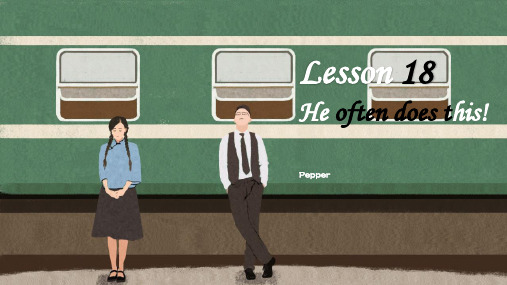
在同一范围内
Guilin is in the north of Guangxi.
to
不在同一范围内,也不接壤 Japan is to the east of China.
next to 紧靠…的旁边
The shop is next to the school.
beside 在…旁边
Come and sit beside (/by) me.
表示延续时间的介词
介词
用法
by
意为“在……之前;不迟于……”
for
意为“在……之前;不迟于……”
in
意为“在……以后;在……时间内”
since
意为“自从……以来;自……以后”
until
用于否定句中,意为“直到……才”,其前的谓语动词多为非延续性动词
用在肯定句中,意为“直到……为止”,其前谓语动词须用延续性动词
by
在…旁边,与 beside 可以互换 There is a chair by(beside) the table.
near 在…附近
There is a theatre near his home.
表示方位的介词
介词
用法
例句
around over
above
under
在…周围 在…(垂直)的正上方 抽象概念职位高低 在…(不一定垂直)的上方 职位高低 在…(垂直的)正下方
have用于“情态动词+have+过去分词”的结构,有推测、假设之意。 1.must+have+过去分词,表示对过去时间发生的动作或存在的情况 的推测,一般用于肯定句。
You must have left your bag in the theatre.
新概念英语2第18课ppt课件
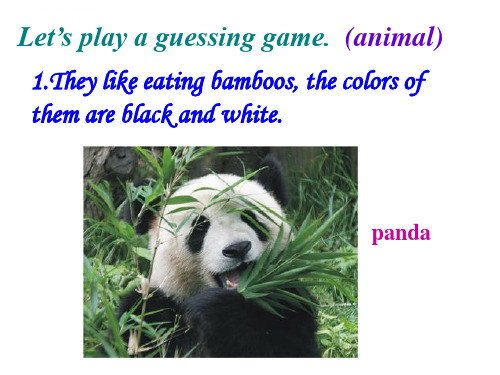
是以区(县)、乡(镇) 、村( 社区) 三级综 治中心 为指挥 平台、 以综治 信息化 为支撑 、以网 格化管 理为基 础、以 公共安 全视频 监控联 网应用 为重点 的“群 众性治 安防控 工程” 。
Today we’ll listen to a story about a woman who couldn’t find her handbag.
True or false?
1.The writer had lunch at a village pub. 2.She couldn’t find her bag after her meal . 3.She could pay the bill . 4.The landlord soon found it for her. 5.The dog had taken it into the park.
panda
“雪亮工程"是以区(县)、乡(镇) 、村( 社区) 三级综 治中心 为指挥 平台、 以综治 信息化 为支撑 、以网 格化管 理为基 础、以 公共安 全视频 监控联 网应用 为重点 的“群 众性治 安防控 工程” 。
2.They are the symbols of Australia, and they usually put their babies in the front pockets.
‘Did you have a good meal?’ he asked. ‘Yes, thank you,’ I answered, ‘but I can’t pay the bill. I haven’t got my bag.’ The landlord smiled and immediately went out. In a few minutes he returned with my bag and gave it back to me. ‘I'm very sorry,’ he said. ‘My dog had taken in into the garden. He often does this!’
新概念英语第二册第18课ppt课件
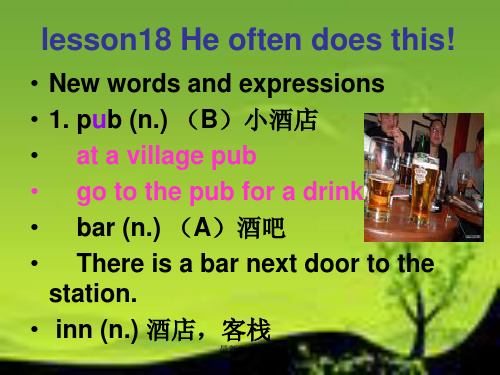
• have a good meal
'Yes, thank you,' I answered,
最新版整理ppt
5
'but I can't pay the bill.
pay the bill
I haven't got my bag.‘
have = have got = own = possess
• The landlord smiled and immediately went out.
• 在一家乡村小酒店
• I had left it on a chair beside the door and now it wasn't there !
• leave sth. sp.
• 把…落在..
• I left a suitcase on the train to London.
• beside (prep.) = next to
7
• 'I'm very sorry,' he said
‘ My dog had taken it into the garden.
take sth. to/into sp. 把…带到/带进…
Their father takes them to school everyday.
He often does this.' He 指My dog
•
☺传单,海报
• put up a bill on the wall
• billboard (n.)
• 宣传板,宣传栏 ad had lunch at a village pub, I looked for my bag.
新概念英语第二册Lesson18课件

give A back to B 上交,交给
捐赠,赠送
2024/5/30
屈服,投降 放弃 投降
give 的短语动词
2024/5/30
在…旁边
除…之外(还有…)
A besides B 除了B,还有A B+A
except A except B 从A中除去B
A-B
2024/5/30
表示“除了”的词
Lesson 18 He often does this
酒吧,酒馆
贵族,大臣,领主,勋爵 土地
业主,房东
You must pay the telephone bill. The bill will become law next year. 议案,法案 Please bill me for the books. (v.)开账单
give A back to B 把A还给B return A to B take
2024/5/30
1. have(has/had) 在完成时中做助动词 I have already had lunch. She had cleaned the room before we came home.
2024/5/30
2024/5/30
Hale Waihona Puke 2. have可以表示“有,拥有” 此时它是一个实义动词 可以和own, possess, have got进行替换 要注意have got表示“拥有”时,其中的have相当于助动词
2024/5/30
2024/5/30
洗(澡) 吃
玩得开心 收到
3. have加名词或者名词短语 表示进行和从事与这个名词相关的事情 具体意思根据名词来翻译 have a smoke
新概念英语第二册Lesson18

Lesson 18 He often does this! 他经常干这种事! First listen and then answer the question. What had happened to the writer's bag? After I had had lunch at a village pub, I looked for my bag. I had left it on a chair beside the door and now it wasn't there! As I was looking for it, the landlord came in. 'Did you have a good meal?" he asked. 'Yes, thank you,' I answered, 'but I can't pay the bill. I haven't got my bag.' The landlord smiled and immediately went out. In a few minutes he returned with my bag and gave it back to me. 'I'm very sorry,' he said. 'My dog had taken it into the garden. He often does this!'
(完整版)新概念英语第二册第18课
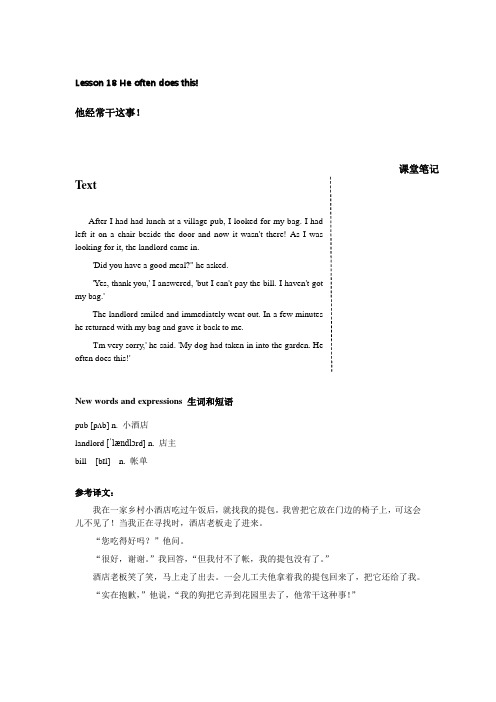
Lesson 18 He often does this!他经常干这事!After I had had lunch at a village pub, I looked for my bag. I hadleft it on a chair beside the door and now it wasn't there! As I waslooking for it, the landlord came in.'Did you have a good meal?" he asked.'Yes, thank you,' I answered, 'but I can't pay the bill. I haven't gotmy bag.'The landlord smiled and immediately went out. In a few minuteshe returned with my bag and gave it back to me.'I'm very sorry,' he said. 'My dog had taken in into the garden. Heoften does this!'New words and expressions 生词和短语pub [pʌb] n. 小酒店landlord [ˈlændlɔrd] n. 店主bill [bɪl] n. 帐单参考译文:我在一家乡村小酒店吃过午饭后,就找我的提包。
我曾把它放在门边的椅子上,可这会儿不见了!当我正在寻找时,酒店老板走了进来。
“您吃得好吗?”他问。
“很好,谢谢。
”我回答,“但我付不了帐,我的提包没有了。
”酒店老板笑了笑,马上走了出去。
一会儿工夫他拿着我的提包回来了,把它还给了我。
“实在抱歉,”他说,“我的狗把它弄到花园里去了,他常干这种事!”Text1.After I had had lunch at a village pub, I looked for my bag.2.I had left it on a chair beside the door and now it wasn't there!3.As I was looking for it, the landlord came in.4.'Did you have a good meal?" he asked.5.'Yes, thank you,' I answered, 'but I can't pay the bill. I haven't got my bag.'6.The landlord smiled and immediately went out.7.In a few minutes he returned with my bag and gave it back to me.8.'I'm very sorry,' he said. 'My dog had taken in into the garden. He often does this!'参考译文1.我在一家乡村小酒店吃过午饭后,就找我的提包。
新概念英语第二册lesson18精品PPT课件
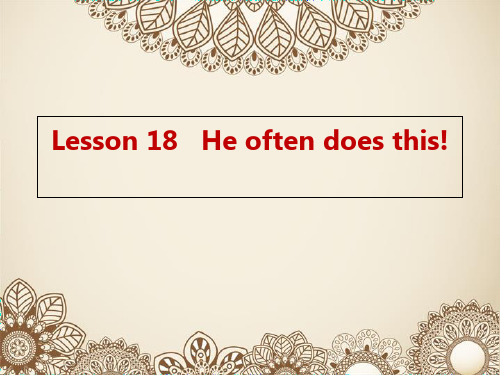
住客栈
2 landlord
(1)主人, 房东(旅馆,家庭,公寓)
(2)地主
lord n . 统治者,主人,贵族,勋爵
Lord! 天啊!哎呀!哎哟! as drunk as a lord 酩酊大醉
landlady 女主人;
3 Bill 1) n. 账单,纸币 (note)
2) n. 招贴,广告,海报
1) n. 账单,纸币 (note) pay the bill/settle the bill
付账
It’s wrong to leave a hotel without paying all your bills. 没有付账离开旅馆是不对的。
新概念英语第二册lesson 18

在英国英语中的疑问句和否定句中have的用法与be相同, 即可以不用助动词do或did;在美国英语中,常用do助 动词和have一起构成疑问句和否定句。 I don’t have a pen.= I haven’t a pen.
③
have 作完全动词时,还可以表示eat, drink, enjoy, take等意思,这时它是行为动词,可以 用于包括进行时的各种时态。当have用于表示 这些含义时,它必须与助动词do等连用以构成 疑问句或否定句。
Jack has given up the watch he stole last week.
Beside VS. Besides
Beside 介词,在…旁边 Besides 介词,除…之外(还),此外,而且,并且
There were a lot of people at the party besides us.
Lesson 18
Pub
n. 小酒店 n. 店主
Landlord Bill
n. 账单
A
village pub
Pub 是public house的缩写
I
had left it on a chair beside the door and now it wasn’t there!
Have dinner, have a cigarette/coffee/a holiday/a good time/a swim/a rest
Give的几个固定搭配 Give的常用含义是“给予,交给”
Give back 还给 Give in 上交、呈交;屈服、让步、投降 Give away 赠送,把…送给(某人) Give up 放弃、抛弃;交出、让出
新概念第二册Lesson 18

助动词
动词
村庄
酒馆
寻找
After I had had lunch at a village pub, I looked for my bag.
I had left it on a chair beside the door and now it wasn't there!
没有
haven't got my bag. ’
一些
The landlord smiled and immediately went otes he returned with my bag and gave it back to me.
‘I'm very sorry, ’he said. ‘My dog had taken it into the
Tim has got two sisters. =Tim has two sisters.
The house hasn’t got a garden.
The house doesn’t have a garden.
1. Sarah hasn’t got / doesn’t have a car. She goes everywhere by bicycle. 2. Charles isn’t happy. He has got / has a lot of problems. 3. ‘Where’s my pen?’’I don’t know. I haven’t got/don’t have it.’
a few 修饰可数名词复数,一些,有点 few 修饰可数名词复数,否定,几乎没有 a little 修饰不可数名词 little 修饰不可数名词,否定 a lot of=losts of 修饰不可数名词&可数名次复数,相当于many/much plenty of 修饰不可数名词&可数名词复数,足够的,大量的,比a lot of 多 1.There was little food in the fridge. It was nearly empty. 2.Can I have a little milk in my coffee,please?
新概念英语第二册第18课
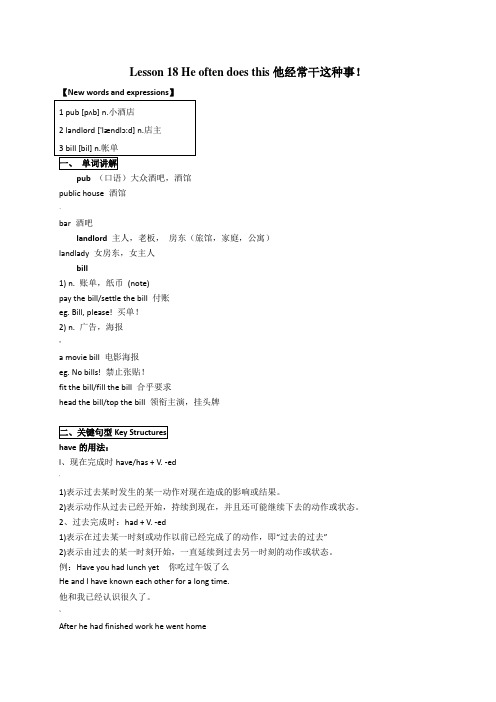
Lesson 18 He often does this他经常干这种事!【New words and expressions】1 pub [pʌb] n.小酒店2 landlord ['lændlɔ:d] n.店主3 bill [bil] n.帐单一、单词讲解pub(口语)大众酒吧,酒馆public house 酒馆、bar 酒吧landlord主人,老板,房东(旅馆,家庭,公寓)landlady 女房东,女主人bill1) n. 账单,纸币(note)pay the bill/settle the bill 付账eg. Bill, please! 买单!2) n. 广告,海报*a movie bill 电影海报eg. No bills! 禁止张贴!fit the bill/fill the bill 合乎要求head the bill/top the bill 领衔主演,挂头牌二、关键句型Key Structureshave的用法:l、现在完成时have/has + V. -ed'1)表示过去某时发生的某一动作对现在造成的影响或结果。
2)表示动作从过去已经开始,持续到现在,并且还可能继续下去的动作或状态。
2、过去完成时:had + V. -ed1)表示在过去某一时刻或动作以前已经完成了的动作,即“过去的过去”2)表示由过去的某一时刻开始,一直延续到过去另一时刻的动作或状态。
例:Have you had lunch yet 你吃过午饭了么He and I have known each other for a long time.他和我已经认识很久了。
~After he had finished work he went home他完成工作后回家了。
We had been waitiing for an hour when he showed up.他出现时,我们己经等了一个小时了。
新概念第二册Lesson 18知识要点总结

新概念第二册Lesson 18复习要点一.L18词汇讲解:1.pub 小酒店bar 酒吧book bar 书吧/tea bar 茶吧/ internet bar 网吧ndlord 店主land 土地lord 领主Lord of Ring 指环王3.bill 账单pay the bill 付账Bill,please./Check, please.结账。
二.重难点:1.have got/has got 有/得了某种疾病,当have 或者has 的意思是“有,得病”的使用,可以互换2.give up 放弃,投降give in 投降/上交give away 送人区分give in 和give up 的不同:The soldiers lost the battle but they didn’t give themselves up . 士兵们输掉了战斗,但是他们没有投降。
The soldiers didn’t give in.士兵们没有投降。
3.a village pun 村庄的小酒馆an apple tree 一棵苹果树a woman doctor 一位女医生注意:two apple trees /two women doctors4.look for 强调动作或者过程find强调结果类比:look at/see listen to/hear put on/wear。
5.leave sb. sth/leave sth. for sb.给某人留下某物6.return的含义返回:He’ll return to his country in 2 years.他两年之后会回来。
返还,偿还:I’ll return your money soon.我会很快还你的钱。
7.几个“除......之外”的词和短语:besides/except/apart from/except fromapart from和except for 可用于句首。
新概念英语第二册第18课ppt课件

采用PP管及配件:根据给水设计图配 置好PP管及配 件,用 管件在 管材垂 直角切 断管材 ,边剪 边旋转 ,以保 证切口 面的圆 度,保 持熔接 部位干 净无污 物
• The landlord smiled and immediately went out. In a few minutes he returned with my bag and gave it back to me. 'I'm very sorry,' he said ' My dog had taken it into the garden. He often does this.'
• beside (prep.) = next to
• As I was looking for it, the landlord 采用PP管及配件:根据给水设计图配置好PP管及配件,用管件在管材垂直角切断管材,边剪边旋转,以保证切口面的圆度,保持熔接部位干净无污物 came in.
• as = when = while 当…时候 • 过去进行时:was ∕were + doing • come in = enter • 'Did you have a good meal ?' he
asked. • have a good meal
'Yes, thank you,' I answered,
'but I can't pay the bill. 采用PP管及配件:根据给水设计图配置好PP管及配件,用管件在管材垂直角切断管材,边剪边旋转,以保证切口面的圆度,保持熔接部位干净无污物 pay the bill I haven't got my bag.‘ have = have got = own = possess • The landlord smiled and immediately went out. • Immediately • = at once = right now = right away • = in no time = in a minute
新概念英语第二册18课ppt课件
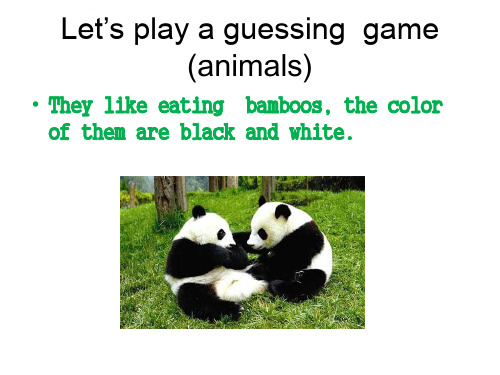
经营者提供商品或者服务有欺诈行为 的,应 当按照 消费者 的要求 增加赔 偿其受 到的损 失,增 加赔偿 的金额 为消费 者购买 商品的 价款或 接受服 务的费 用
现在完成时
• ①现在完成时 表示过去某时发生的某一动作对现在造 成影响或者是结果 I have finished reading the book .我已经读完这本书了。
过去完成时态
• ①过去完成时态表示在过去某一时刻或者动作以前已经完 成。即过去的过去。
我昨天已经完成我的作业了。 I had finished my homework yesterday . ②表示由过去的某一时刻开始,一直延续到过去另一时刻的
动作或者状态。 After he came back ,I had lived in Xiamen for 2 years .
give in =hand in 上交 投降 Though the problem is hard but I won’t give in.
give up give up smoking Do the exercise in page 82.
经营者提供商品或者服务有欺诈行为 的,应 当按照 消费者 的要求 增加赔 偿其受 到的损 失,增 加赔偿 的金额 为消费 者购买 商品的 价款或 接受服 务的费 用
• 'Did you have a good meal?" he asked. • 'Yes, thank you,' I answered, 'but I can't pay the
bill. I haven't got my bag.' • The landlord smiled and immediately went out.
新概念英语2_第18课
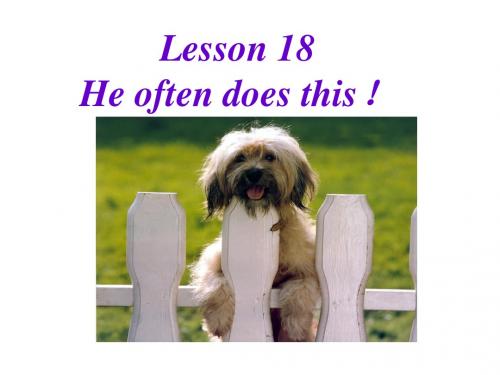
3.have可译为“拥有”=have got.但have got常用于一般现 在时,其他时态中用have. 在英式英语中,have用法与be相同,即可以不用助动词 do/does/did进行否定和疑问。 Eg: He has a pen.—He hasn’t a pen.—Has he a pen?— Yes ,he has.—No, he hasn’t.
The landlord smiled and immediately went out. In a few minutes he returned with my bag and gave it back to me. ‘I'm very sorry,’ he said. ‘My dog had taken it into the garden. He often does this!’ 1. immediately 立刻,马上 同义词:at once, instantly, right away, straight away 2. in a few minutes 几分钟后 类似的说法: in a few days in a few weeks in a few months in a few years
I had left it on a chair beside the door and now it wasn’t there! 1.leave ---left---left a.离开,出发 leave sp离开某地 leave for sp出发去某地 Eg:他要离开重庆。 He will leave Chongqing. 他要出发去重庆。 He will leave for Chongqing. b.把(人、物)留下、丢下、遗留等。 Eg: Have you left anything in the car? 2. beside: prep.在…旁边 Eg:他的汽车正停在那辆卡车的旁边。 His car is parking beside the truck.
新概念英语第二册Lesson18课件

Let’s watch a short video and find out how the dog is.
Listening Studio
ThWe lahnadtlohrda’d hs daopgpheandetdakteon tthheebwagriitnetro’thes gbaardge?n.
leave还可以作名词,表示“休假,假期”。 My best friend, Joan is spending her leave in Hawaii. 我最好的朋友琼正在夏威夷度假。
I had left it on a chair beside the door and now it wasn’t there!
I had left it on a chair beside the door and now it wasn’t there!
leave的用法
v. 离开(某处) Mr. Smith left the room at two o’clock. 史密斯先生两点离开房间的 。v. 留下;丢下;落下(常表示事物落在/忘在某处) Better take off your shoes and leave them outside. 最好把鞋子脱掉,放在外面。 v. 留给;交给(一般与介词with或to搭配) We didn’t find him and left word with his neighbour. 我们没有找到他,于是留了口信给他的邻居。
Reading Land
Read and learn.
After I had had my lunch at a village pub, I looked for my bag. I had left it on a chair beside the door and now it wasn’t there! As I was looking for it, the landlord came in.‘Did you have a good meal?’ he asked.‘Yes, thank you,’ I answered, ‘but I can’t pay the bill. I haven’t got my bag.’The landlord smiled and immediately went out. In a few minutes he returned with my bag and gave it back to me.‘I’m very sorry,’ he said. ‘My dog had taken it into the garden. He often does this!’
- 1、下载文档前请自行甄别文档内容的完整性,平台不提供额外的编辑、内容补充、找答案等附加服务。
- 2、"仅部分预览"的文档,不可在线预览部分如存在完整性等问题,可反馈申请退款(可完整预览的文档不适用该条件!)。
- 3、如文档侵犯您的权益,请联系客服反馈,我们会尽快为您处理(人工客服工作时间:9:00-18:30)。
Lesson 18 He often does this! 他经常干这种事!After I had had lunch at a village pub, I looked for my bag. I had left it on a chair beside the door and now it wasn't there! As I was looking for it, the landlord came in.'Did you have a good meal?’ he asked.'Yes, thank you,' I answered, 'but I can't pay the bill. I haven't got my bag.'The landlord smiled and immediately went out. In a few minutes he returned with my bag and gave it back to me.'I'm very sorry,' he said. 'My dog had taken it into the garden. He often does this!'New words and expressions 生词和短语pub n. 小酒店landlord n. 店主bill n. 帐单参考译文我在一家乡村小酒店吃过午饭后,就找我的提包。
我曾把它放在门边的椅子上,可这会儿不见了!当我正在寻找时,酒店老板走了进来。
“您吃得好吗?”他问。
“很好,谢谢。
”我回答,“但我付不了帐,我的提包没有了。
”酒店老板笑了笑,马上走了出去。
一会儿工夫他拿着我的提包回来了,把它还给了我。
“实在抱歉,”他说,“我的狗把它弄到花园里去了,他常干这种事!”1.He often does this! 他经常干这种事!he 在这里指代的是狗。
动物通常用it来代表,即被看成像东西一样。
但是,指宠物、家畜或民间故事中的动物时,我们经常也用he, she, who等,即使得它们“人格化”并具有性别。
用阴性代词指某个动物或东西时尤其有一种亲切的含义:e.g. 我有一只小猫。
她每天早上喝牛奶。
I have a little cat. She drinks milk every morning.乔治的鹦鹉亨利能说几个单词。
只要有灯光他就叫。
George’s parrot ['pærət], Henry, can speak a few words. He always calls when there are lights.2. After I had had lunch at a village pub, I looked for my bag. 我在一家乡村小酒店吃过午饭后,就找我的提包。
1) after过去完成时态常同表示时间状语的从属连词after 一同使用,如:e.g. 他把信全写完后干了些家务活。
After he’d written all her letters, she did some housework. 假如从句中先于主句谓语动词动作发生的那个动词动作很短暂,常可用一般过去时来代替过去完成时态,如:e.g. 他把猫放出去后,它就跑开钻进了灌木丛。
After she put the cat out, it ran off into the bushes.但是,当两个分句为同一主语时,更早发生的那个动作通常用过去完成时态来表示。
如:e.g. 他送走她后就锁上门,睡觉去了。
(see sb. off 1. 为…送行;送别2. (BrE)赶走,驱逐(某人))After he had seen her off, he locked the door and went to bed.2)have在have lunch这个词组中是完全动词而不是助动词,因此,像其他完全动词一样,它的过去完成时要加助动词had.3) pub [pʌb] n. (also formal public house) (both BrE) a building where people go to drink and meet their friends. Pubs serve alcoholic [ˌælkəˈhɔlik] and other drinks, and often also food.酒吧;酒馆(在英国英语的口语中较常见)e.g. 咱们去酒吧喝杯酒吧。
Let’s go to the pub for a drink.他们下酒馆喝酒去了。
They’ve gone down the pub for a drink.去酒吧喝酒go round to the pub for a drink酒馆供的午餐a pub lunch 当地酒馆的老板the landlord of the local pubbar n. a place where you can buy and drink alcoholic and other drinks酒吧wine bar n. a bar or small restaurant where wine is the main drink available(主要供应葡萄酒的)酒吧;小酒馆inn n. 1. (old-fashioned BrE) a pub, usually in the country and often one where people can stay the night(通常指乡村的,常可夜宿的)小酒店2. (AmE) a small hotel, usually in the country(通常指乡村的)小旅馆;客栈e.g. 住客栈stay at an inn4)look for (sb./sth) to try to findsb./sth. 寻找;寻求look for强调“寻找”这个动作或过程,而不涉及结果。
e.g. 我到处寻找我的钥匙,但还是没找到。
I looked for my key everywhere, but I couldn’t find it.我正在找我的包。
I am looking for my bag.找工作to look for a jobfind v. ~sth (for sb.)/~(sb.) sth. to get back sth./sb. that was lost after searching for it/them找到;找回(强调结果,不能用于进行时态)e.g. 你能帮我找我的包吗?Can you find my bag for me?/Can you find me my bag?find v. to discover sb./sth. unexpectedly or by chance(意外或偶然地)发现,碰到e.g. 我们在办公室附近发现了一家挺好的新餐馆。
We’ve found a great new restaurant near the office.他醒来后发现自己在医院里。
When he woke up, he found himself in hospital.find out (about sth./sb.)/find out sth. (about sth./sb.) to get some information about sth./sb. by asking, reading, etc.查明,弄清(情况) 强调经过研究努力之后发现、找出、搜出结果。
e.g. 我还没有发现有关他的什么情况。
I haven’t found anything out about him yet.你能查清楚会议什么时候开始吗?Can you find out what time the meeting starts?后来我们才弄清楚我们是校友。
We found out later that we had been at the same school. 3. I had left it on a chair beside the door and now it wasn't there! 我曾把它放在门边的椅子上,可这会儿不见了!1) leave [li:v] v., n.v. (left, left)1. vi.& vt. to go away from a person or a place离开(某人或某处)e.g. 离开某地to leave some place 离开去某地to leave for some place[v] 飞机于12:00起飞前往北京。
The plane leaves for Beijing at 12:00.[vn] 飞机于8:00在希思罗机场起飞。
The plane leaves Heathrow at 8:00.2. to make or allow sb./sth. to remain in a particular condition, place, etc.使保留,让…处于(某种状态、某地等)e.g. [vn-adj.] 请把门开着吧。
Leave the door open, please.[vn-ing] 别让她在外边雨里等着。
Don’t leave her waiting outside in the rain.[vn to inf] 把米饭煮20分钟。
Leave the rice to cook for 20 minutes.让他们保持原样。
Leave them as they are.3. vt. ~sth./sb. (behind) to go away from a place without taking sb./sth. with you忘了带;丢下:e.g. 我把包丢在公共汽车上了。
I’ve left my bag on the bus.别忘了带上自己的随身物品。
Don’t leave any of your belongings behind.他身体不适,因此我们只好把他留下。
He wasn’t well, so we had to leave him behind.4. vt. to not do sth. or deal with sth. immediately不立刻做;不马上处理:e.g. 你怎么什么事都留到最后一刻才处理?Why do you always leave everything until the last moment?5. (be left) vt. to remain to be used, sold, etc.留下备用(或销售等)e.g. 还有咖啡剩下吗?Is there any coffee left?6. to make sth. happen or remain as a result使发生;造成,使留下为(某种结果):e.g. 她给我的印象是她不满意自己的工作。
